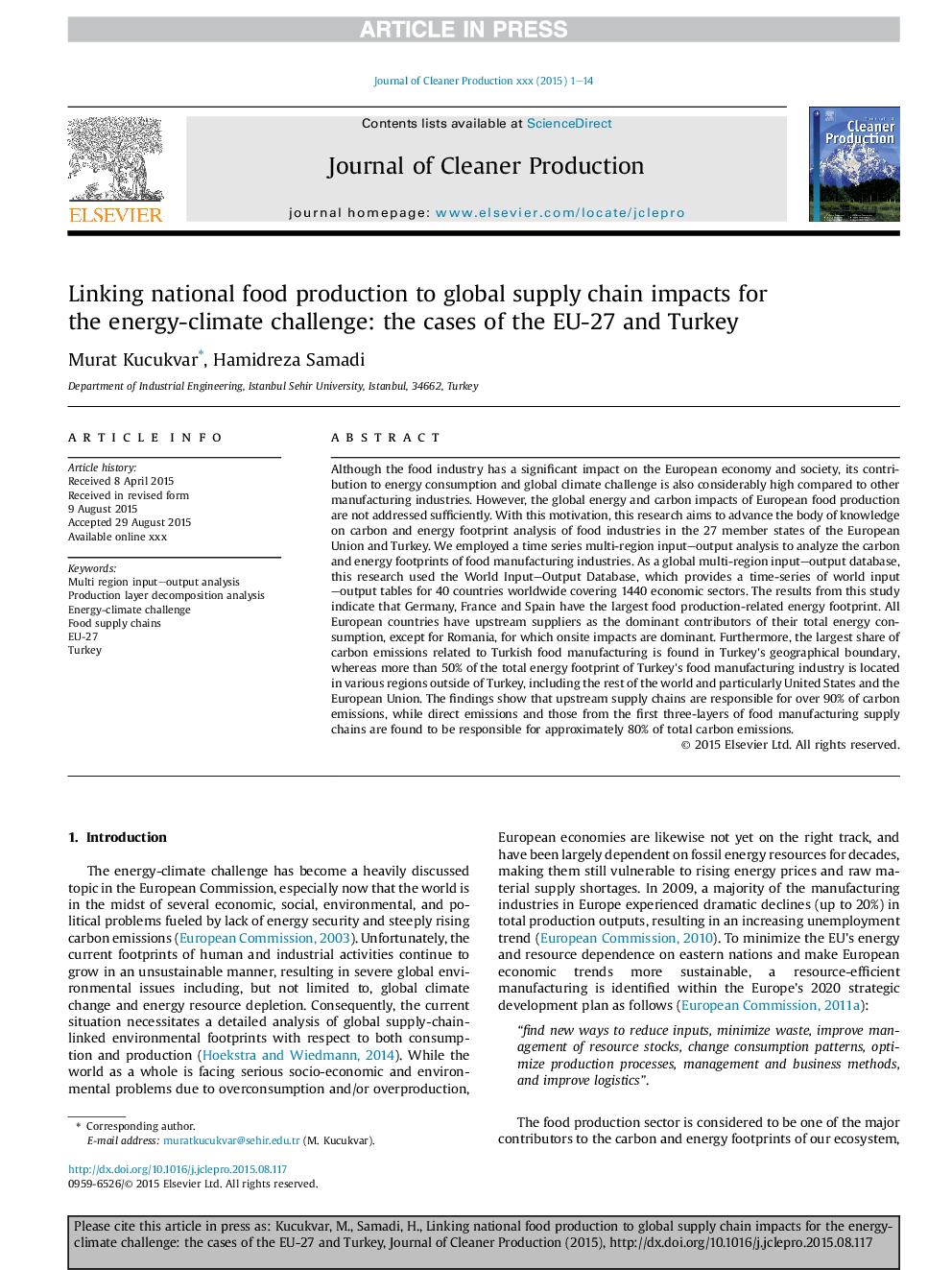| کد مقاله | کد نشریه | سال انتشار | مقاله انگلیسی | نسخه تمام متن |
|---|---|---|---|---|
| 10688173 | 1017980 | 2015 | 14 صفحه PDF | دانلود رایگان |
عنوان انگلیسی مقاله ISI
Linking national food production to global supply chain impacts for the energy-climate challenge: the cases of the EU-27 and Turkey
ترجمه فارسی عنوان
پیوند تولید مواد غذایی ملی با تأثیرات زنجیره تامین جهانی برای چالش انرژی-آب و هوا: موارد اتحادیه اروپا 27 و ترکیه
دانلود مقاله + سفارش ترجمه
دانلود مقاله ISI انگلیسی
رایگان برای ایرانیان
ترجمه چکیده
اگرچه صنایع غذایی تأثیر قابل توجهی بر اقتصاد و جامعه اروپا دارد، اما سهم آن در مصرف انرژی و چالش های آب و هوایی جهانی نسبت به دیگر صنایع تولیدی نیز بسیار بالا است. با این حال، اثرات جهانی انرژی و کربن تولید غذای اروپا به اندازه کافی مورد توجه نیست. با این انگیزه، این تحقیق با هدف ارتقای دانش دانش در زمینه تحلیل کاهشی و انرژی صنایع غذایی در 27 کشور عضو اتحادیه اروپا و ترکیه انجام شده است. ما یک تحلیل زمانی ورودی / خروجی چند منطقه ای را برای تجزیه و تحلیل رد کربن و انرژی صنایع تولید مواد غذایی انجام دادیم. این تحقیق به عنوان پایگاه داده ورودی-خروجی چند منطقه ای، این تحقیق از پایگاه داده ورودی-خروجی جهانی استفاده کرد که مجموعه ای از جداول جهانی ورودی-خروجی برای 40 کشور جهان را پوشش می دهد که شامل 1440 بخش اقتصادی است. نتایج حاصل از این مطالعه نشان می دهد که آلمان، فرانسه و اسپانیا دارای بزرگترین اثرات انرژی مرتبط با تولید مواد غذایی هستند. همه کشورهای اروپایی تامین کنندگان بالادست را به عنوان مشارکت کنندگان غالب مصرف کل انرژی خود، به جز رومانی، که تاثیرات آن در حوزه غالب است، دارد. علاوه بر این، بزرگترین سهم انتشار گازهای کربن مربوط به تولید مواد غذایی ترکیه در مرز جغرافیایی ترکیه است، در حالیکه بیش از 50 درصد کل انرژی مصرفی صنایع غذایی ترکیه در مناطق مختلف خارج از ترکیه، از جمله سایر نقاط جهان قرار دارد و به ویژه ایالات متحده و اتحادیه اروپا. یافته های این تحقیق نشان می دهد که زنجیره های عرضه در بالا شامل بیش از 90 درصد انتشار کربن هستند، در حالیکه انتشار مستقیم و کسانی که از سه لایه اول زنجیره تامین مواد غذایی تولید می شوند حدود 80 درصد کل انتشار کربن را تشکیل می دهند.
موضوعات مرتبط
مهندسی و علوم پایه
مهندسی انرژی
انرژی های تجدید پذیر، توسعه پایدار و محیط زیست
چکیده انگلیسی
Although the food industry has a significant impact on the European economy and society, its contribution to energy consumption and global climate challenge is also considerably high compared to other manufacturing industries. However, the global energy and carbon impacts of European food production are not addressed sufficiently. With this motivation, this research aims to advance the body of knowledge on carbon and energy footprint analysis of food industries in the 27 member states of the European Union and Turkey. We employed a time series multi-region input-output analysis to analyze the carbon and energy footprints of food manufacturing industries. As a global multi-region input-output database, this research used the World Input-Output Database, which provides a time-series of world input-output tables for 40 countries worldwide covering 1440 economic sectors. The results from this study indicate that Germany, France and Spain have the largest food production-related energy footprint. All European countries have upstream suppliers as the dominant contributors of their total energy consumption, except for Romania, for which onsite impacts are dominant. Furthermore, the largest share of carbon emissions related to Turkish food manufacturing is found in Turkey's geographical boundary, whereas more than 50% of the total energy footprint of Turkey's food manufacturing industry is located in various regions outside of Turkey, including the rest of the world and particularly United States and the European Union. The findings show that upstream supply chains are responsible for over 90% of carbon emissions, while direct emissions and those from the first three-layers of food manufacturing supply chains are found to be responsible for approximately 80% of total carbon emissions.
ناشر
Database: Elsevier - ScienceDirect (ساینس دایرکت)
Journal: Journal of Cleaner Production - Volume 108, Part A, 1 December 2015, Pages 395-408
Journal: Journal of Cleaner Production - Volume 108, Part A, 1 December 2015, Pages 395-408
نویسندگان
Murat Kucukvar, Hamidreza Samadi,
